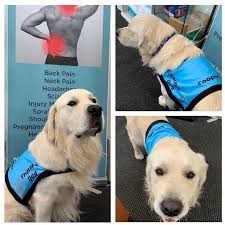Accredited Therapy Dog Training: Enhancing Lives One Paw at a Time
Therapy dogs play a vital role in enhancing the well-being of individuals in various settings, from hospitals and nursing homes to schools and rehabilitation centres. Accredited therapy dog training programmes are designed to equip dogs with the skills and temperament needed to provide comfort, support, and companionship to those in need.
Accredited therapy dog training goes beyond basic obedience training. It focuses on developing specific behaviours and responses that are essential for therapy work, such as remaining calm in stressful situations, being comfortable around unfamiliar people and environments, and exhibiting gentle and predictable behaviour.
Therapy dogs undergo rigorous training under the guidance of experienced trainers who understand the unique requirements of therapy work. Through positive reinforcement techniques and socialisation exercises, dogs learn how to interact safely and effectively with individuals of all ages and backgrounds.
Accredited therapy dog training programmes also educate handlers on best practices for working with their therapy dogs. Handlers learn how to read their dog’s body language, anticipate potential triggers or stressors, and create a supportive environment for successful interactions with those they are helping.
Once trained, accredited therapy dogs can make a profound impact on the lives of those they visit. They provide emotional support, reduce anxiety and stress, improve social interactions, and bring joy to individuals facing challenging circumstances.
Accredited therapy dog training not only benefits the recipients of therapy dog visits but also enhances the bond between handler and dog. Working together as a team to bring comfort and happiness to others strengthens the relationship between human and canine companions.
If you are interested in becoming involved in accredited therapy dog training or would like to learn more about how therapy dogs can make a difference in your community, consider reaching out to reputable organisations that offer certification programmes. Together, we can continue to spread love, compassion, and healing through the power of therapy dogs.
Guidance on Becoming an Accredited Canine Professional: Therapy and Assistance Dog Training FAQs
- Can you be a dog therapist?
- How do I become an accredited dog behaviorist?
- How can I register my dog as a therapy dog?
- Can I train my dog to be an assistance dog?
Can you be a dog therapist?
Becoming a dog therapist, or more commonly known as a canine therapist, is a rewarding career path that involves working with dogs to improve their mental and emotional well-being. While the term “dog therapist” can encompass various roles such as dog behaviourist, dog trainer, or even a therapy dog handler, it typically refers to professionals who specialise in providing therapeutic interventions for dogs with behavioural issues, anxiety, trauma, or other psychological challenges. To pursue a career as a dog therapist, individuals often undergo extensive training and certification in areas such as canine behaviour, psychology, and counselling techniques. By understanding and addressing the emotional needs of dogs, dog therapists play a crucial role in promoting their overall health and happiness.
How do I become an accredited dog behaviorist?
To become an accredited dog behaviourist, individuals typically need to pursue relevant education and training in animal behaviour, psychology, and training methods. Accredited institutions or organisations offer certification programmes that provide in-depth knowledge of canine behaviour and practical skills required to assess and modify behaviours effectively. Gaining hands-on experience through internships or apprenticeships under experienced behaviourists can also be beneficial. Continuous professional development and staying updated on the latest research and techniques in the field are essential to maintaining accreditation as a dog behaviourist. By investing time and effort into formal education, practical experience, and ongoing learning, aspiring individuals can work towards becoming accredited dog behaviourists who make a positive impact on the lives of dogs and their owners.
How can I register my dog as a therapy dog?
To register your dog as a therapy dog, the first step is to ensure that your dog meets the necessary criteria for temperament, behaviour, and training required for therapy work. It is recommended to enrol in an accredited therapy dog training programme where both you and your dog can learn the skills needed to become a successful therapy team. Once you have completed the training and feel confident in your dog’s abilities, you can then apply for registration with a recognised therapy dog organisation. This process typically involves an assessment of your dog’s behaviour and interactions with individuals to determine their suitability for therapy work. By following these steps and working closely with experienced trainers and organisations, you can successfully register your dog as a therapy dog and begin making a positive impact in the lives of others.
Can I train my dog to be an assistance dog?
Training a dog to be an assistance dog is a specialised process that requires careful consideration and adherence to specific guidelines. While it is possible for some pet owners to train their own dogs to become assistance dogs, it is important to understand the rigorous training standards and legal requirements involved in this process. Accredited therapy dog training programmes can provide valuable insights into the skills and behaviours needed for an assistance dog role, as well as guidance on how to navigate the certification and registration procedures. Seeking professional advice and support from reputable organisations that specialise in assistance dog training can help ensure that both the dog and handler are adequately prepared for this important role in enhancing the lives of individuals in need.

